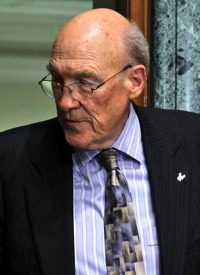
White House deficit commission co-chairman Alan Simpson spoke at a Christian Science Monitor roundtable on Friday morning saying, “I can’t wait for the blood bath in April. It won’t matter whether two of us [on the commission] have signed this or 14 or 18. When debt limit time comes, they’re going to look around and say, ‘What … do we do now? We’ve got guys [House freshmen] who will not approve the debt limit increase unless we give ’em a piece of meat, real meat, off of this package.’ And boy the blood bath will be extraordinary.”
The 112th Congress will be seated on Monday, January 3, 2011 as the debt clock continues ticking. At this writing the national debt is $13.8 trillion and is increasing by $4 billion every day. The current debt limit was raised earlier this year to $14.294 trillion, which means the government’s authorization to overspend will end in 124 days, or very close to April 1 (April Fool’s Day).
Incoming House Speaker John Boehner is already taking a strong verbal stand: “We’re going to have to deal with it as adults. Whether we like it or not, the federal government has obligations and we have obligations on our part.” National Republican Congressional Committee (NRCC) chairman Pete Sessions joined in: “Our understanding, as [the new majority in the House], we have a debt limit issue. The United States must pay its debts.”
Whether any of the commission’s recommendations will be adopted before April is an open question. Some consider them “eye-popping” while others here and here consider the commission’s recommendations modest if not outright frivolous. Thomas Sowell considers the commission itself as merely “political cover,” making it “politically possible to spend money first and get somebody else to recommend raising taxes [to pay for it] later. They are a virtual guarantee of never-ending increases in both spending and taxes."
Why provide political cover? Leave the big spenders out there naked in front of the voters! Either the elected officials will change their ways or the voters can change the officials they elect.
Naturally, Keynesian economist and Obama administration apologist Paul Krugman, ridicules Simpson and his “blood bath” comments, and then explains why the debt limit will have to raised again: “There’s a legal limit to federal debt, which must be raised periodically if the government keeps running deficits … and since nobody thinks the budget can be balanced [by April], the debt limit must be raised to avoid a government shutdown.” Krugman then says that unless the debt limit is raised again, an economic standoff “might deny many Americans essential services, wreak havoc in financial markets and undermine America’s role in the world.”
Brian Buetler, writing for Talking Points Memo, expanded on the dangers facing the country in the event of a shutdown: “First [the government] must stop paying for things, resulting in furloughs and a tightening or suspension of government services.” Interest rates on U.S. Treasuries would increase, putting additional pressure on the deficit and the economy. Buetler calls it a “classic hostage situation,” a game of chicken in which the Republicans attempt to stare down the Democrats. This weekend Sen. Tom Coburn (R-Okla.) said he wouldn’t vote for the debt ceiling increase unless at least $300 billion was sliced from the budget. And when Sen. Jim DeMint (R-S.C.) was asked if he would vote for it, he told NBC: “No, I won’t. Not unless this debt ceiling is combined with some path to balancing our budget. Returning to 2008 spending levels. Repealing Obamacare. We have got to demonstrate that we have the resolve to cut spending.”
Seasoned observers are not impressed with this “nibbling around the edges,” as David Limbaugh put it. Surprisingly, former Fed chairman Alan Greenspan came closer than most to what it will take to resolve the matter: “Only politically toxic cuts or rationing of medical care, a marked rise in the eligible age for health and retirement benefits, or significant [price] inflation, can close the deficit.”
Far from being a bloodbath, the game of chicken that is scheduled to begin on January 3 will continue to be played out until April Fools’ Day and will likely end in a stalemate, better known as gridlock. The best news is that no additional spending bills are likely to be passed in the meantime.
Photo of Alan Simpson: AP Images



